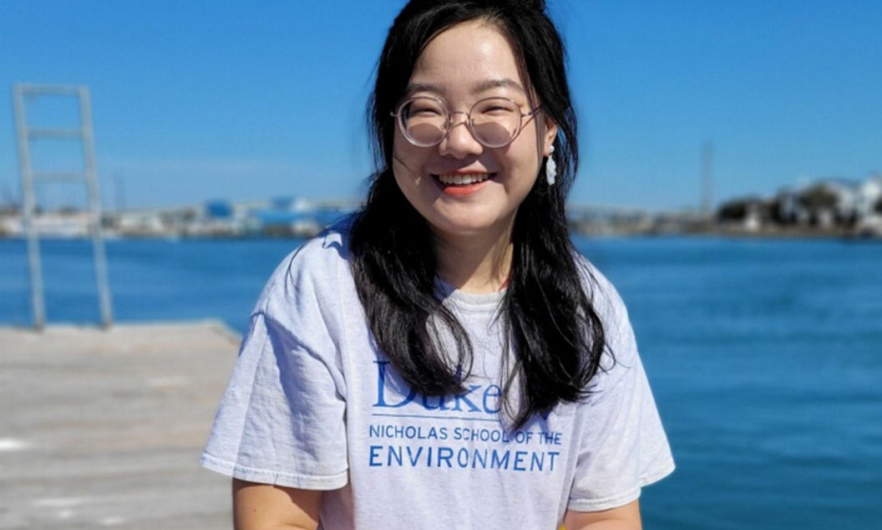Junyao Gu, MS-GEE ’19
Junyao Gu is a third-year PhD student in Marine Science and Conservation at Duke University.

Junyau Gu is a third-year Ph.D. student in Marine Science and Conservation at Duke University. Her research focuses on marine microbiology and microbial ecology.
Tell us about what you are doing now.
Broadly, I am interested in using a variety of approaches including computational, DNA, qPCR, and bioinformatics tools to investigate the diversity and dynamics of microbial communities, focusing on marine cyanobacteria and their role in the ocean environment, the relationship among them and biogeochemical cycles, climate change, health risks, and help formulate environmental policies that protect human and ecosystem health.
Besides being fascinated with exploring the mysterious tiny marine microbial world, talking with people from different backgrounds is always one of the ways I love to better see the world. Currently, as a part of the Duke University Marine Laboratory’s Seas the Day Podcast team, I combine those interests together and generate great audio storytelling. A recent episode I lead and produced is called “Navigating the Choppy Waters of the US PhD Application Process”.
How did your degree prepare you for current and future roles in environmental science?
The education I received from our EHE department is second to none. My master’s adviser, Sarah Preheim, and all the professors that I took classes from or worked with, especially Edward Bouwer, Alan Stone, and Hugh Ellis, during my time at Hopkins changed my life. They directed me to find the research interests that I would dedicate my life to exploring. They taught me tons of important skills that I need to carry on my research. The most invaluable thing is they showed me what great scientists and professors are like. What I learned from them shaped who I am today, and I am sure what they taught me will help me become a professor as great as them one day. I am extremely thankful to be one of their students.
What appealed to you about our program?
The first-class education and professors of our program appealed to me so much. Another appealing point is that EHE is a cross-divisional department. I really love interdisciplinary research, so knowing students can benefit from both the Whiting School of Engineering and the Bloomberg School of Public Health made me so excited to attend.
What, if anything, surprised you about coming to Hopkins and/or Baltimore?
The most surprising side about Hopkins is the great campus safety and security. I am so astonished to find that Hopkins really does an amazing job in ensuring our safety on campus and in the surrounding areas.
Hopkins offers 24/7 free transportation service, which I loved so much. I still remember while I was at Hopkins, I sometimes studied in the library until late evening during the final exam times. No matter how late I left the library, there were always campus shuttles that offered fast and free rides to drive me home. The drivers were so nice that they did not leave until they saw me open the door and get into the building safely. During my two years at Hopkins, I never felt unsafe.
What's your advice for prospective students?
I would suggest always being curious and open to new knowledge. Environmental science is quite an interdisciplinary field, incorporating knowledge from diverse areas. Therefore, it is important to welcome new ideas and keep learning. Another piece of advice is to have the courage to jump out of your comfort zones, and let your enthusiasm and curiosity lead you. Finally, just enjoy every journey in your life!
Environmental Health and Engineering is a cross-divisional department spanning the Bloomberg School of Public Health and the Whiting School of Engineering. This hybrid department is uniquely designed to lead pioneering research and prepare the next generation of scholars and professionals to solve critical and complex environmental issues. Learn more about our programs.
